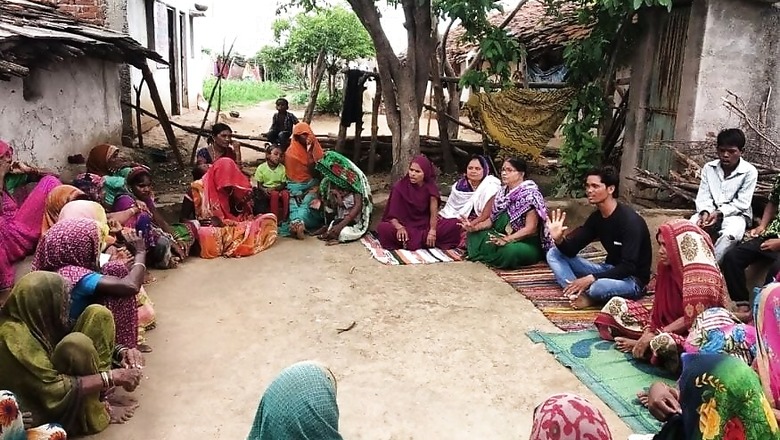5 Yrs Ago, This MP Hamlet Faced Water Woes, Lack of Jobs. Now it Has Navigated Lockdown Without Help

views
As India grapples with a hard time due to the Covid-19 lockdown, this small tribal settlement populated by about 400 people is faring just okay.
When ration packets were supplied to the settlement called Kota Gunjapur, nestled close to the Panna Tiger Reserve in Madhya Pradesh, several families returned them saying they had enough and the food could help other distressed people in the region.
However, just five years ago, the hamlet had struggled with water shortage, malnourishment in children and lack of jobs, which resulted in large scale migration each year. But with some help, the village transformed itself to become what it is today.
Earlier, the children in the settlement suffered from severe malnourishment; locals did not have sufficient to make supplies for the whole year and farmers were debt-ridden. Unaware of their rights and unable to often even afford vegetables, many of them migrated to big cities like Delhi, Mumbai to earn a living each year. Anganwadi workers would visit once a month and leave after distributing 'Take Home Ration' under a tree.
The residents earned a living through wage works, cattle rearing and selling forest produce. The area was battered by reoccurring floods, and droughts. Eighty per cent of the locals - from 76 families making 400 people in the hamlet - migrated to metro cities in search of work, leaving behind children and elderly people who had to survive on just government pensions.
But in 2015, volunteers from the NGO Vikas Samvad began to approach the settlement to address the people's issues. With persistent efforts the volunteers managed to break the ice. Locals began to interact with them.
The residents were made aware of their rights and the importance of uniting and speaking collectively as a community. A group of 15 women was formed in the village in efforts to reform the hamlet.
Thirteen youngsters were also grouped and engaged in schooling, health awareness and extra curricular activities. To bridge gender the gap, six girls were also brought on board. Children too, were gathered and taught about the importance of health, education, sanitation, environment and sports.
The groups met regularly to discuss the local issues.
An Early Childhood Care and Development Centre was also established and a few women were appointed to oversee and carry out the functioning. The Centre took care of the nutritional needs of 26 malnourished kids and arranged eggs and vegetables for them.
Even while in the clutches of poverty, the entire community got involved in the betterment of the Centre and provided a room, wood, wheat and vegetables from their kitchen gardens.
To meet the water shortage in the hamlet (which further curtailed farming efforts in the area) a local pond was dug up through the combined efforts of volunteers and locals in 2015. Eleven wells were also cleaned and made functional.
After that, the monsoons helped replenish the village's fresh water sources and 99 acre land of the locals was irrigated. Local youngsters followed things up with the PHE department and got defunct handpumps repaired.
The volunteers provided seeds to the farmers, and soon, the parched landscape turned green. Special training on organic farming was also given to a dozen farmers.
Kitchen Garden
The initiative of 'Kitchen Gardens' was very helpful to the residents as the area suffered frequent droughts. The NGO stepped in, and asked the locals to set up the kitchen garden close to the washing area of their homes, so the waste water could be utilised.
Within a short time, the 76 families sported 'Kitchen Gardens' in their backyard. They now keep the vegetables for their consumption and sell the extra produce in nearby areas, which helps them keep get adequate nutrition and more money.
Combating Malnutrition
To battle the problem of malnutrition, children were provided with Ayurvedic medicines and milk. They were also given oil massages for 21 days. With persistent efforts at the Anganwadis and at home, children have retained their health to a large degree.
The Forest Department was also asked to offer some land to the locals to carry out sports activities. The department agreed and now youth take part in extra curricular events and sports at the grounds.
Slowly and steadily, the locals have also started participating in community affair meetings and are now much more aware about their rights and demands. With the help of volunteers, the locals have availed many government welfare schemes related to housing, pension, and acquiring caste certificates.
Yousuf Baig, the regional volunteer of Vikas Samvad, said that with the construction of a stop dam and recharging of water sources, agriculture had flourished in the settlement. This not only enhanced the income of the locals but also reduced migration, he added.
Before the coronavirus lockdown was imposed, a handful of locals had gone elsewhere for work and they too returned and were taken care of by the community, he said.
With the availability of vegetables and nutritious supplements at the Anganwadi, malnourishment has ebbed significantly at the settlement, added Baig.
The most astounding thing was that the settlement had braced the lockdown without the help of any outsiders, through the previous efforts in repleting their resources. “When we went there to distribute ration packets during lockdown, they returned it saying it could be used for other people in distress,” he said. Some underprivileged people were also helped by the community through provision of ration and other essentials.
Ramvishal Gaud, a native of the hamlet and now Vikas Samvad's local coordinator said that earlier locals had no work, migration was high and there was no awareness about rights. All these problems were taken care of through the help of various local groups.
Gaud who himself is a beneficiary of this local transformation, has just completed his Masters. He said that locals are now aware of their rights like their quota of ration, availability of roads, lights, pension, building for school, Anganwadis, among other things.
They were not even aware that if required, they could also demand for MGNREGS work. “Recently forest guards had blocked the route going across the tiger reserve and locals collectively complained to the forest officers who got the route cleared,” said Gaud, smug about the level of improvement of villagers in seeking their rights.
Education is bolstered as earlier migrants took the kids along with them and their education and nutrition took a beating, he said, adding that as now hardly anyone migrated, children got proper care.
The process for the construction of a building for Anganwadi, and roads and provision of better electricity in the village was also underway, he informed.
The ‘aware’ village has a Suchna Sandarbh Kendra (Information Reference Centre) which runs from a room in Ramvishal Gaud’s house and has copies of all the details of government rules, acts, forms and the required information in form of pamphlets, leaflets and handbooks issued by the government.
“Villagers take these material and read at home,” said Ramvishal. The centre also has books on songs, stories and so on.
Previously, locals had wished to leave their settlement, but with the gradual transformation, everyone wants to stay.
Kapsa Bai, 28, is delighted that her kids are now better nourished due to her 'kitchen garden'. Locals also swap vegetables and don’t need to go to Panna to buy them, she added. The Anganwadi also allows women to leave their children in safe hands for the day while they work. Our grown up kids no longer need to babysit our younger ones and can go to school, she said.
"We had no road and this caused a lot of trouble especially in the monsoons. Then the women's group was formed and we started discussing development plans. Then plans for a road, a small bridge and other infrastructure was chalked out and we presented it before the Gram Sabha (Jardhova panchayat) and soon the cement concrete road work began," said 55-year-old Gila Bai Gond.
“This helped us understand that the Gram Sabha is a powerful platform and we can get several things from there through discussion,” added the elderly woman.
The previously backward and poor hamlet now stands as an example for the region. It runs a seed bank of its own and offers seeds to nearby villages. It also teaches organic farming, water recharge techniques and rights awareness to those who need it in the area.




















Comments
0 comment